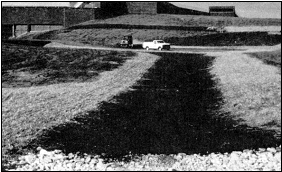 |
 |
To Print Use The pdf File
ILLINOIS URBAN MANUAL
PRACTICE STANDARD
TEMPORARY SWALE
(feet)
CODE 980
 (Source: MN Protecting Water Quality in Urban Areas) |
DEFINITION
A temporary excavated drainageway.
PURPOSE
The purposes of this practice are to prevent runoff from entering disturbed areas by intercepting and diverting it to a stabilized outlet and to intercept sediment-laden water in disturbed areas and divert it to a sediment-trapping device.
CONDITIONS WHERE PRACTICE APPLIES
Temporary swales are constructed:
This standard applies to swales draining 10 acres or less. For drainage areas larger than 10 acres, refer to the practice standard GRASS-LINED CHANNEL 840.
CRITERIA
The channel cross section shall be designed using the criteria in Table 1.
Stabilization of the swale shall be completed within 10 days of installation in accordance with the practice standards TEMPORARY SEEDING 965, PERMANENT VEGETATION 880, MULCHING 875, EROSION BLANKET 830.
The flow channel shall be stabilized using the criteria in Table 2.
All stone or concrete linings will be placed on geotextile fabric meeting the requirements in material specification 592 GEOTEXTILE Table 1 or 2, class I, II, or IV. In highly erodible soils refer to the next higher slope grade for type of stabilization. Recycled Concrete Equivalent shall be concrete broken to the required size, and shall contain no steel reinforcement.
In areas where the drainage area is undisturbed, the swale shall have an outlet that functions without erosion, and dissipates runoff velocity prior to discharge off the site. Examples of stable outlets include LEVEL SPREADER 870 and ROCK OUTLET PROTECTION 910.
In areas where the drainage area is disturbed, runoff shall be conveyed to a sediment trapping facility until the drainage area above the swale is adequately stabilized. Examples of appropriate sediment trapping facilities include practice standards IMPOUNDMENT STRUCTURE - ROUTED 842 or TEMPORARY SEDIMENT TRAP 960.
CONSIDERATIONS
The on-site location may need to be adjusted to meet field conditions in order to utilize the most suitable outlet condition.
If the temporary swale is used to divert flows from entering a disturbed area, a sediment-trapping device may not be needed.
PLANS AND SPECIFICATIONS
Plans and specifications for installing temporary swales shall be in keeping with this standard and shall describe the requirements for applying the practice to achieve its intended purpose. At a minimum include the following items:
All plans shall include the installation, inspection, and maintenance schedules with the responsible party identified.
OPERATION AND MAINTENANCE
Vegetated swale channels should be inspected regularly to check for points of scour, bank failure or inadequate vegetative cover; rubbish or channel obstruction; rodent holes or excessive wear from pedestrian or construction traffic.
Swales collecting runoff from disturbed areas shall remain in place until the disturbed areas are permanently stabilized.
Lined swale channels should be checked regularly for deterioration from freezing, salt or chemicals; scour or undermining at the inlet and outlet; or points of sediment deposition.
Any needed repairs shall be made promptly.
NRCS IL February 1994
CHANNEL CROSS SECTION REQUIREMENTS
|
A |
B |
|
|---|---|---|
|
Drainage area |
< 5 acres |
5 – 10 acres |
|
Bottom width flow channel |
4 feet |
6 feet |
|
Depth of flow channel |
1 foot |
1 foot |
|
Side slopes |
2:1 or flatter |
2:1 or flatter |
|
Grade |
0.5% minimum |
0.5% minimum |
CHANNEL STABILIZATION REQUIREMENTS
|
Type of Treatment |
Channel Grade (%) |
A < 5 acres |
B 5 – 10 acres |
|---|---|---|---|
|
1 |
0.5 – 3.0 |
Seed & straw mulch |
Seed & straw mulch |
|
2 |
3.1 – 5.0 |
Seed & straw mulch |
Seed & cover w/ jute or excelsior; sod; or line with IDOT CA-2 or CA-3 coarse aggregate |
|
3 |
5.1 – 8.0 |
Seed & cover w/ jute or excelsior; sod; or line with IDOT CA-2 or CA-3 coarse aggregate |
Line with IDOT RR-3 rock |
|
4 |
8.1 – 20.0 |
Line with IDOT RR-3 rock |
Engineering design |